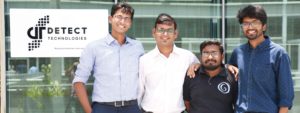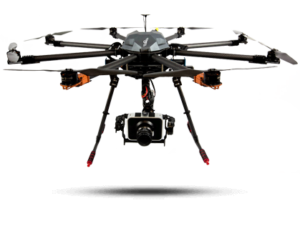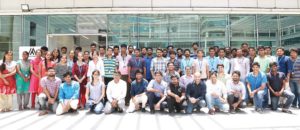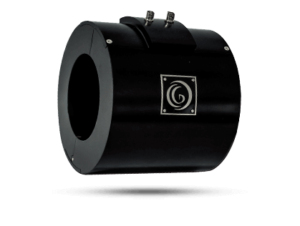Axilor Ventures, Keiretsu Forum and CIIE funded Detect Technologies was set up at IIT Madras’ incubation cell in 2013 to build technologies for the heavy industrial sector for asset monitoring. After five years of research and development, the founding team came out with market ready products. It now aims to build and supply technology and license them to at least 20 different countries.

Tarun Mishra, a dual degree student of Metallurgy at IIT Madras, is a recipient of the top ten innovator award in India given by the India Innovation Growth Program. Under the guidance of Professor Krishnan Balasubramanian, he worked on a material that could generate ultrasonic signals at high temperatures in 2009. Until then, all sensors could generate the waves to about 100 Degree Celsius only while Tarun’s patent could work till 350 Degree Celsius.
After his graduation, he got placed in Reliance Industries and it is here that his business idea came to life. He saw Reliance’s shutdowns and leakages and the resultant losses it incurred. This made him realise that his patent could be commercialised to help industries eradicate downtime and improve their levels of planning. He met Prof Krishnan with this idea and the two scouted for people to work with. Subsequently, they were introduced to the rest of the founding team.
Detect Technologies was set up at IIT Madras’ incubation cell in 2013 and was founded by alumni Daniel Raj David, Harikrishnan AS, Karthik R, Tarun Mishra and professor Krishnan Balasubramanian to build technologies for the heavy industrial sector for asset monitoring. The team then spent five years in research and development and eventually came out with market ready products.

The journey so far!
Operating in the Industrial Internet of Things segment, Detect offers asset management solutions to industries through its own technology. “Our technology is applicable to many companies outside India. From a technology-dependent country, we want to become a technology creator,” says Mishra.
The company currently commercialises two products. GUMPS (guided ultrasonic monitoring of pipe systems) is a sensor for pipelines, monitoring thickness change at high temperatures. Currently, asset risk assessment is done manually with ultrasonic probes. “However, the future is about digitisation and automation at different levels and we want to automate the entire liability component or risk assessment of industries,” says Tarun.
Its other product, NOCTUA – an intelligent drone for inspections of large volumes of assets, is meant for industries that have assets close to 150 to 200 meters high. The drone inspects the external and internal environments of the asset.
The existing drone solutions are ineffective as they offer only a video. “If you hit one single tower, the damage runs up to more than Rs. 100 crore and hence, industry usage is very limited,” states Mishra. Recognising this, Detect introduced NOCTUA with a differentiation in automation and analysis. “Every drone in the world requires a GPS. We made our own – indoor positioning system to give could give 10 cm accuracy,” states Mishra.
He continues, “We also built a brain – a computer vision deep component – to the drone where it could not just see but also identify defects, damages and faults with the large amount of data generated.” The drones literally can fly in pitch dark condition. “Giving an automated inspection approach in pitch dark condition is where we gave value to industries,” says a proud Mishra.
GUMPs is largely used in the oil and gas and steel sectors while NOCTUA is for all industries such as steel, oil and gas, chemical, fertiliser, power and mines. The company is now entering the nuclear segment also. “We have patented technology on both the components,” says he.

Markets unlimited
Detect operates in close to 26 different sites in India, including largest clients such as Tata Steel, Reliance Industries, BPCL, HPCL, Coromandal Fertilisers and Adani. The company has a large growth opportunity and is on its path towards global expansion. For instance, oil and gas industry is almost US $20 billion to US $60 billion in size and there are 700 such industries world over. These industries have major pipelines, and any damage to them can be harmful to the environment.
“GE, which is our partner as well as competitor, has validated the solution and Shell has recognised us in their program. This gave us access to many other countries,” states Mishra. The company does not file tenders or open bids but goes for single party contracts.
During its early days, the company did not have the capacity to take large orders. Initially, it was a part of the IIT Madras ecosystem, which became a good enabler for its capacity. “At any point of time, we had close to 40 students working inside the campus. And from February to November 2016, we were just doing trials for different clients,” recalls Mishra. The company did about 12 to 13 trials in four different client sites and gained a lot of confidence.
“We took our first order in December 2016 from Reliance and later from Coromandel Fertilisers. It was a steep curve from there on,” recalls Mishra. In about 10 to 11 months, it was present in 80 per cent of oil and gas companies in India and started diversifying into other segments once it gained confidence.
In third quarter of 2017 fiscal, the company gained four annual rates contracts. In May 2017, Detect also raised its first round of funding (from Axilor Ventures, Angel network Keiretsu Forum, IIM Ahmedabad’s CIIE) which gave it the bandwidth to grow and add capacity, resulting in its international expansion, especially Middle East, Europe and US. “Our client, Shell, has a lot of international presence and we can operate in 80 countries,” says Mishra.

The company currently has a team size of 43 and has grown well in 2017. This year it aims to increase its team size to 110 to 120.
However, no success comes without challenges. “Big challenge is to deal with uncertainty,” says Mishra. This apart, a company needs capital as it is working on a new technology, that too hardware, and build confidence in its clients. The company started interacting with its clients on a more collaborative approach. However, building confidence took time. Retaining employees was also another challenge.
Detect’s go- to-market strategy is not to build a large number of client base but understand the scope of usability in a single client. Its business development team is always on the client’s site, inspecting and identifying when the asset will come back for inspection and finding new use cases.
And to achieve its growth, the company is hiring at various levels. “We aim at bringing balance between energy and experience and hence hiring both seniors and freshers,” says Mishra. The company has members from IIT Madras, Shell and GE on its advisory board.
“Our 2022 vision is to become the world’s largest technology company for non-destructive evaluation by building, supplying and licensing technology to at least 20 different countries and grow to about 100 different enterprise clients across the globe and mitigate the entire risk for the Indian industries,” says Mishra on a concluding note.
Automation, the key!
Currently, risk assessment of assets is done in a manual way with ultrasonic probes. But, the future is all about digitisation and automation at various levels. The company wants to automate the entire liability component or risk assessment of industries.
